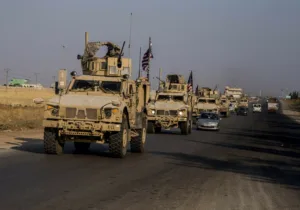The just war tradition I have been describing in this series is the product of a maturing political theory that asserts war is morally permissible—or, sometimes, required—only when the proper authority—the political ruler over whom there is no one greater charged with the provision and maintenance of the order and justice—and therefore the peace—of the political community for which they are responsible determines, in the last resort, that nothing but proportionate and discriminate military force is capable of protecting threatened innocents, requiting an injustice, or punishing grave evil in a manner decisive enough to end the conflict and in its wake to reestablish or impose order and justice in sufficient enough degrees to allow the possibility of conciliation.
We’ll recall that the presence of a proper authority is the first requirement of jus ad bellum (jab)—that category of the just war framework that guides us in determining when it is right to fight. But because it is not the only jab requirement it is immediately clear that the just war view of governmental power does not include an always unqualified endorsement of that power’s deployment. As a product of Christian realism, the classical just war view asserts that a ruler’s right to rule is grounded in the primary responsibility to order the use of power to the morally appropriate well-being of the political community in their care. This primary responsibility extends, necessarily so, to a secondary one: a just ruler must also pursue and maintain ordered, just, and peaceful relations with other political communities.
This last point requires a brief comment. It is true that a political ruler’s primary responsibility is aimed at the good of those he rules. We all have special obligations to particular persons in our lives. With this in view, my primary responsibility as father is for the welfare of my family. This includes their moral, intellectual, and physical wellbeing. I am morally charged to provide for their basic security and to see to their enjoyment of basic goods such as food and shelter. So, for instance, if you, dear reader, are not an immediate family member and you happen to be hiking with me and my daughter and you and my daughter suffer the misfortune of falling into a pit of vipers you should expect that the first person I pull out of that pit will not be you. Nor, more grimly, would it be your child or if the choice was between yours or mine. That doesn’t mean that I would not do everything in my power to save both. Nor does it mean that I always attempt to save my own over you no matter the details of the particular case. Circumstances might affect the basic principle and reorient my behavior—we can imagine a multitude of scenarios in which I pull you out first. But the normative assumption remains: we have primary obligations to some people over others.
Just so, while a political ruler’s primary responsibility is to the welfare of those he rules, it is not his only responsibility. For instance, the US has defense pacts with more than 50 allies and partners. If our word is our bond—and it ought to be—we are obligated, to varying degrees, to respond to attacks against any one of them as if the attack were a shared danger.
In addition to these formal obligations, there is probably also something to the old Pottery Barn rule that if you break it, you own it. While we need to be mindful not to fall into the trap of foolishly trying to justify sunk costs, the consequences of our disgraceful departure from Afghanistan ought to suffice in suggesting that there’s something to this rule that is important and that we forget only to our shame and moral peril.
In any case, there are potentially uncomfortable implications in all of this. If we have obligations to defend kith and ki and, where able, allies, partners, and other nations in peril, then we have to have the capacity—and the will—to meet those obligations. A derivative responsibility of political authority, therefore, is the cultivation of power—diplomatic, economic, martial, etc.—sufficient to meet our obligations.
This begins to get at what Paul Ramsey called the esse—the essential nature or purpose—of politics. The use of power is part-and-parcel of being a political authority and instrumental to achieving the ends for which political authority was ordained by God. Romans 13 makes clear that an essential aim of the use of force is the punishment of evil. This notion extends out from the mandate God delivered in the Noahic covenant. Foreshadowing just war’s requirement of just cause, God demands that human beings, acting as God’s agents, execute justice against those who harm the innocent. It is because we are made in the image of God, not despite it, that proper political authorities and their delegated agents are to wield the sword in order to do justice. Force becomes the ultima ratio regnum—the last argument of kings—when nothing else will successfully enforce the law. This properly ordered relationship between the power and purpose of sovereign authority forms, in Ramsey’s casting, the bene esse of politics—the benevolent essence of political authority.
In the dark September days after the planes hit, political theorist Jean Bethke Elshtain mused to a friend: “Now we are reminded of what governments are for.” 9/11, she forever after insisted, made plain that “the primary responsibility of government is to provide for basic security—ordinary civic peace.” This responsibility—this bene esse—she understood to be a divine mandate. “This does not mean,” she cautioned, “that every government and every public official is godly but, rather, that each is charged with a solemn responsibility for which there is divine warrant…a political ethic is an ethic of responsibility.”
Following Augustine’s hortatory temper, Elshtain insisted that Christians cannot remain aloof as they await the eschaton. Against the depravity, bloodshed, and injustice of the present age, the security and peace necessary for human beings to enjoy basic human goods requires a basis upon which to reside. Moreover, its preservation, if in the last resort nothing else will work, requires force. The ruling authority, therefore, remains a, if not the, critically necessary agent for humanity’s flourishing. I’m not speaking in some ultimate sense, of course. We know, for instance, that human beings can flourish, in critical ways, even in the direst circumstances in which there are no functioning political authorities to protect them. Our recent observance of Holocaust Remembrance Day reminds us that even in the lager human beings could flourish—at least in the limited sense of morally and spiritually flourish. While these may be superior forms of flourishing to physical flourishing, we should be under no illusions. The manifestation in public and private life of certain words: order, concern, community, justice, responsibility, and love, tend toward the welfare of the innocent; while others: disorder, atomization, solipsism, injustice, desertion, and indifference, tend toward their annihilation. The incarnation reminds us, if nothing else does, that matter matters. Love of neighbor includes concern for the conditions of their neighborhood.
We ought to reminded, in light of all of this, that authorities can use martial force in two kinds of ways. The first, bellum (as in jus ad bellum) is force directed at public ends or goods. The second, duellum—from which we get the term duel—is force for private ends or goods. Bellum can be good or evil—and determining which a prospective bellum will be is, of course, the entire purpose of the just war framework. Duellum, essentially private war, can only ever be evil. These different uses of force map directly onto Augustine’s distinction between two existing kinds of love. First, caritas—or charity—which is rightly ordered love characterized by other-centered acts of self-donation. The second, cupiditas—or cupidity—is disordered or misdirected love characterized by self-centered acts of other-donation. The just war tradition helps orient a ruler’s loves, properly ordering them and guiding them toward the just exercise of their vocation. It is in this sense that just war tradition serves as a means by which sovereigns can pursue not just the flourishing of their political community, but their own as well.
The just war framework begins with the requirement of proper authority because of its primary regard for the importance of proper order. Only the proper authority has the responsibility to determine whether the proposed cause for war is sufficient enough to put the resources of the political community—material, treasure, and lives—at risk in order to fight it. Much of the modern project of recovering a classical vision of just war casuistry and adjacent political visions involve the reassertion of a conception of political authority rooted in responsibility for the common good. This has always contrasted with the more anemic view of sovereignty regnant within the Westphalian tradition, which too often sees sovereignty rooted merely in positional authority within a particular set of borders. As James Turner Johnson has put it:
This latter understanding embodies real benefits, but it also has glaring faults. As far too many historical examples have shown, it gives cover to individuals and parties who use the powers of rule to menace and oppress their own people and others while seeing to no higher end than their own aggrandizement. Something is very deeply flawed in a conception that casts the mantle of sovereign protection over demonstrably evil rulers as diverse as Mobutu, Milosevic, Saddam Hussein, and Kim Jong Il.
The classical just war tradition, in sharp contrast, offers instead a view of politics that conceives of sovereignty as a moral responsibility through which, in Johnson’s terms, “good government can be distinguished from bad,” and the just causes of war can be met and overcome.







 Live in the DC area? Sign-up for Providence's in-person events list!
Live in the DC area? Sign-up for Providence's in-person events list!